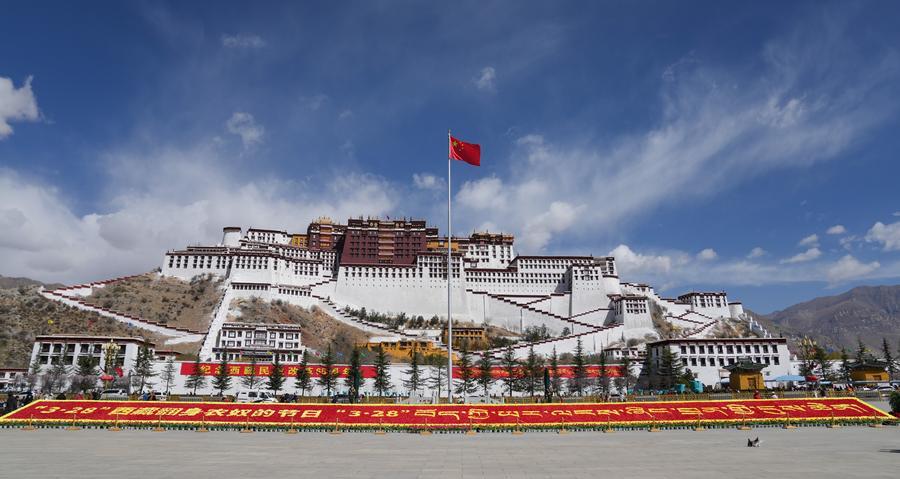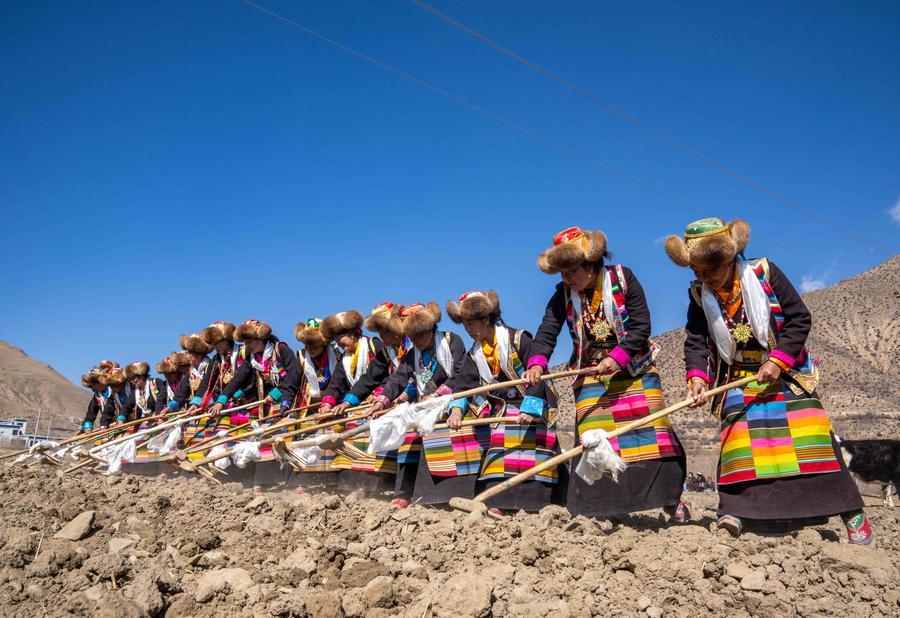U.S. act regarding Xizang exposes double-faced nature

The national flag of China is seen on the square in front of the Potala Palace on the Serfs' Emancipation Day in Lhasa, capital of southwest China's Xizang Autonomous Region, March 28, 2024. (Xinhua/Jigme Dorje)
BEIJING, July 13 (Xinhua) -- The United States once again egregiously interfered in China's internal affairs by signing a Xizang-related act into law. This move distorts Xizang's history and reality while also exposing the U.S. side's double-faced practice.
U.S. President Joe Biden said in a statement that the act "does not change longstanding bipartisan United States policy to recognize the Tibet Autonomous Region and other Tibetan areas of China as part of the People's Republic of China." Based on this stance, its so-called "Promoting a Resolution to the Tibet-China Dispute Act" -- a purely U.S. domestic law -- constitutes a gross interference in China's domestic affairs. Even the act's name implies ill intentions.
The 14th Dalai Lama is widely known as a political exile who engages in anti-China separatist activities under the guise of religion. He and his followers have long sought "Tibet independence," betraying the country. When it comes to contact and talks, the Chinese government has been constant and clear in stating that the 14th Dalai Lama must fully reflect on and thoroughly correct his political propositions.
In another example of wordplay, the act claims "the United States Government has never taken the position that Tibet was a part of China since ancient times." This obviously endorses and emboldens the secessionist clique. Since ancient times, the region has forged unbreakable geographical, consanguineal, political, economic and cultural bonds with the rest of China.
The act is riddled with other deliberate distortions and misrepresentations. It hypes up "self-determination" for Tibetans. Yet, the right to self-determination was intended specifically for inhabitants of colonies or non-self-governing territories to fight colonialism and imperialism. It certainly cannot apply to an ethnic group living in an integral part of a sovereign country. The United Nations condemns any effort to disrupt the national unity, territorial integrity or political independence of a state.
The act once again proves the United States is playing the "Xizang card" to contain China. It has for a long time engaged in political manipulation over Xizang-related matters under the guise of defending human rights. Such manipulations include enacting legislation to smear and destabilize Xizang, and providing substantial funding to separatist forces advocating for "Tibet independence."
Today, Xizang is dynamic and flourishing. Since the epoch-making democratic reform in 1959 that abolished the serfdom system, of which the Dalai Lama used to be the chief representative as well as a diehard defender, the region has made exceptional progress in human rights. It has eradicated absolute poverty, along with the rest of the country. People of diverse ethnic groups have benefited from the region's all-round achievements, which include political stability, social harmony, economic growth, ecological advancements and ethnic unity.

Farmers participate in a ceremony marking the start of spring farming in Gyaimain Village in Qonggyai County of Shannan, southwest China's Xizang Autonomous Region, March 16, 2024. (Xinhua/Tenzing Nima Qadhup)
The U.S. politicians might be dreaming that it will be able to impact the plateau region's stability, harmony or prosperity. But no sensible country will give any credence to the act's claims, rendering the naive bets made by the United States and separatist forces ineffective. The act -- another example of U.S. hegemony -- will have no effect other than to erode Washington's already fragile international credibility.
Nations that lack credibility will fade. The negative global engagements of the United States, such as instigating or fueling wars, its practice of unilateralism and double standards, and interference in other countries' domestic affairs, are increasingly pushing its credibility to the brink of bankruptcy.
Xizang-related affairs concern China's core interests. The United States must learn from history, deliver on its commitments to China, and refrain from undermining China's sovereignty and territorial integrity in the name of human rights or anything else.
Should the United States persist in its politically motivated missteps, the decline of its international standing is highly likely to accelerate and potentially lead to irreversible consequences.
